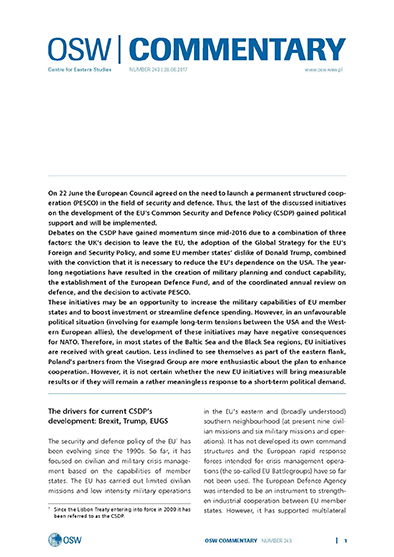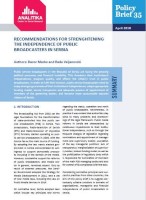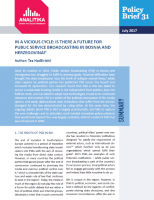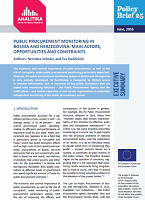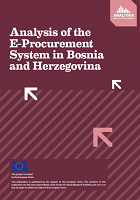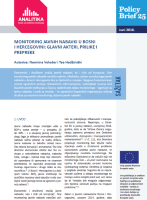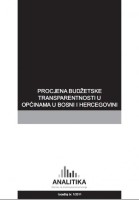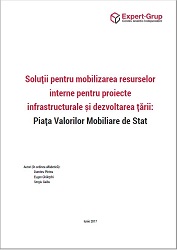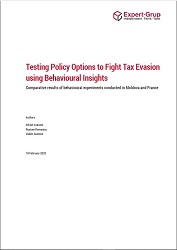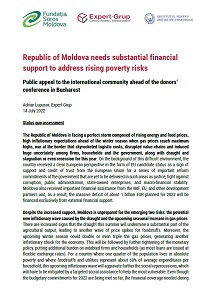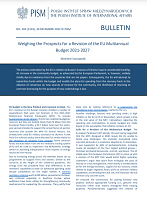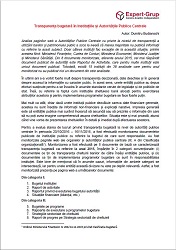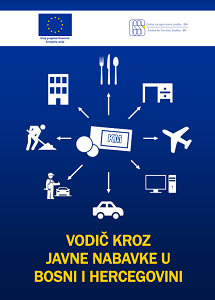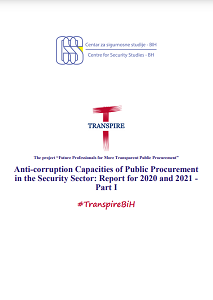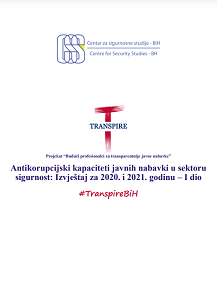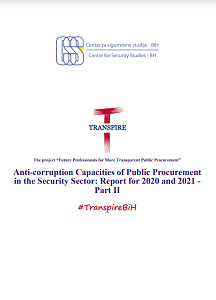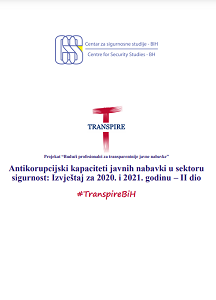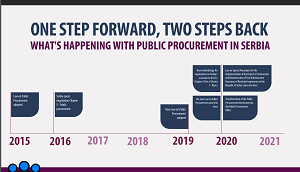Author(s): Mirna Jusić / Language(s): Bosnian
Uzimajući u obzir važnost koncepta budžetske transparentnosti na lokalnom nivou, ali i angažmana građana u budžetskom procesu, koji se ističe u međunarodnoj literaturi, ova studija imala je za cilj odgovoriti na pitanje da li je i u kojoj mjeri lokalna uprava u BiH stvorila podsticajno okruženje za građansko učešće u budžetskom procesu kroz institucionalizaciju procedura, formata i mehanizama budžetske transparentnosti. Preciznije, pokušali smo pružiti odgovor na pitanja da li su budžeti na lokalnom nivou transparentni i da li je lokalni budžetski proces otvoren u smislu da dozvoljava nadzor i učešće građana. Kako bi se odgovorilo na spomenuta pitanja, u okviru istraživanja primijenjeni su međunarodni kriteriji ili standardi dobre prakse iz međunarodne literature o budžetskoj transparentnosti, poput za lokalni nivo modificiranog Upitnika otvorenog budžeta (Open Budget Questionnaire) International Budget Partnershipa (IBP), koji definira kriterije za otvorenost budžeta. Na osnovu tih kriterija analiziran je domaći zakonski okvir relevantan za budžetski proces, ali i prakse na lokalnom nivou u BiH. Studijom su tako obuhvaćeni različiti aspekti budžetske transparentnosti, te ona ukazuje na interdisciplinarnu prirodu ovog popularnog koncepta. U okviru istraživanja, primijenjen je pristup studije tipičnih slučajeva na šest odabranih općina iz oba entiteta u BiH. Za svaku od općina analiziran je sadržaj izvještaja o izvršenju budžeta za 2009. i usvojenog godišnjeg budžeta za 2010. Osim toga, analiziran je i sam budžetski proces, koji podrazumijeva četiri koraka: pripremu, usvajanje, izvršenje i nadzor budžeta. Također, u skladu sa entitetskim zakonima o slobodi pristupa informacijama, u sve 141 općine u BiH poslani su zahtjevi koji su se odnosili na godišnji plan izvršenja budžeta općina. Službeni web-sajtovi svih bosanskohercegovačkih općina analizirani su kako bi se ocijenilo u kojoj mjeri općine objavljuju budžetske dokumente na internetu. Istraživanje je pokazalo da je transparentnost u odnosu na pristup budžetskim dokumentima u BiH donekle zadovoljavajuća. Kada je u pitanju poštivanje Zakona o slobodi pristupa informacijama, oko 82% bosanskohercegovačkih općina odgovorilo je na zahtjev poslan u okviru istraživanja do ili nakon zakonskog roka, a oko 18% općina nije odgovorilo na zahtjev. Studije slučajeva pokazale su da su skoro svi analizirani budžetski dokumenti objavljeni ili dostupni na zahtjev u šest općina. S druge strane, analiza zakonskog okvira pokazala je da relevantni entitetski zakoni ne propisuju u potpunosti pripremu svih relevantnih dokumenata, kao ni njihovo pravovremeno objavljivanje, što je svakako neophodno za lakši pristup dokumentima. Bilo bi posebno važno propisati obavezu pripreme i pravovremenog objavljivanja budžetskih informacija koje su prilagođene građanima, poput građanskih budžeta. Analiza službenih web-sajtova općina ukazuje na to da su općine počele koristiti internet kao sredstvo za informiranje javnosti o budžetskom procesu. Ipak, općine uglavnom ne koriste prednosti interneta kako bi budžetske dokumente učinile dostupnim: samo 26% bosansko-hercegovačkih općina objavilo je budžet za 2010. i izvještaj o izvršenju za 2009. na službenom web-sajtu; 32% na sajtu je objavilo samo budžet; 30% općina koje imaju sajt nije objavilo ove budžetske dokumente, a 11% je općina koje nemaju funkcionalan sajt. Obaveza objavljivanja budžetskih dokumenata na službenim web-sajtovima treba biti propisana relevantnim zakonima i propraćena izgradnjom kapaciteta na lokalnom nivou u oblasti e-uprave i podrške općinama na razvoju i upravljanju sajtovima prilagođenim korisnicima. Trenutno izostaje transparentnost budžetskog sadržaja, a sam sadržaj budžetskih dokumenata nije prilagođen građanima. Neprecizan zakonski okvir ne osigurava zadovoljavajući obim informacija koje bi budžet učinile razumljivijim i sveobuhvatnijim kada je u pitanju ono što lokalna vlast planira uraditi ili je već uradila. Informacije o učinku i informacije usmjerene ka građanima trenutno nisu zakonska obaveza niti dio lokalne prakse. Pored toga, u praksi se često ne poštuje u potpunosti relevantan zakonski okvir, što dodatno otežava razumijevanje dokumenata. Zakon o budžetskom sistemu RS-a mora preciznije definirati sadržaj budžeta i sadržaj izvještaja o izvršenju, koji se dostavljaju SO, a oba entitetska zakona i relevantni pravilnici trebaju biti detaljniji u pogledu narativnog dijela budžeta i izvještaja o izvršenju budžeta, u skladu sa međunarodnom dobrom praksom. Entitetski zakoni o budžetima/budžetskom sistemu trebaju propisati obavezu uspostavljanja veze između lokalnih politika i prihoda i rashoda u budžetskim dokumentima i u godišnjim izvještajima o izvršenju. Zakon o budžetima FBiH trebao bi biti eksplicitniji u pogledu toga da li su programske informacije kao dio budžetskih dokumenata obavezne ili ne. Potencijalnom uvođenju programskog budžetiranja treba prethoditi zakonski propisana programska klasifikacija. Budući da programsko budžetiranje i budžetiranje zasnovano na učinku podrazumijevaju niz promjena na lokalnom nivou u pogledu ljudskih, materijalnih resursa, strateškog razmišljanja i političke i administrativne volje, neophodne su analize modaliteta za uvođenje ovih reformi na lokalnom nivou. Između ostalog, trebalo bi analizirati provedivost takvih reformi, uzimajući u obzir faktore poput kapaciteta, troška, smjernica viših nivoa vlasti i slično. Transparentnost budžetskog procesa trenutno je ograničena. Za razliku od RS-a, javne rasprave o nacrtu budžeta trenutno nisu obavezne u FBiH, a dio općina ne organizira javne rasprave u okviru kojih se građanima predstavljaju nacrti budžeta za narednu fiskalnu godinu. Relevantni entitetski zakoni o budžetu/budžetskom sistemu trebaju propisati obavezu javnih konsultacija sa građanima o nacrtu budžeta i trebaju biti usklađeni sa zakonima o lokalnoj samoupravi. Također, sve općine trenutno nemaju transparentne kriterije za odabir kapitalnih projekata ili projekata NVO, iako neke općine trenutno rade na uspostavi ovih praksi. Takvi kriteriji trebaju biti institucionalizirani lokalnim propisima i javno dostupni. Pozitivno je što općine imaju aktivne budžetske komisije pri općinskom vijeću/skupštini općine (OV/SO), koje razmatraju i pružaju mišljenja o budžetskim dokumentima; ipak, njihov kapacitet i kvalitet rada nije razmatran u ovom istraživanju. Istraživanje je također pokazalo da Ured za reviziju FBiH, odnosno Glavna služba za reviziju javnog sektora RS-a ne vrše redovno i dovoljno često reviziju na lokalnom nivou, što umanjuje transparentnost samog budžetskog procesa i može pogodovati smanjenju fiskalne odgovornosti općina. Eksterna revizija godišnjeg izvršenja budžeta treba biti redovnija, a za najučinkovitije rješenje neophodno je razmotriti različite modalitete za eksternu reviziju. Istovremeno, treba biti propisana obaveza da tijelo nadležno za reviziju i OV/SO redovno prate korektivne mjere koje su lokalne vlasti preduzele u skladu sa nalazima ili preporukama eksterne revizije. Također, treba propisati obavezu pripreme i objavljivanja izvještaja o mjerama koje nadležni općinski organi planiraju preduzeti u skladu sa izvještajima revizije, te mjerama koje su preduzete.
More...
